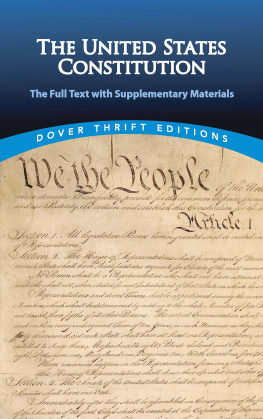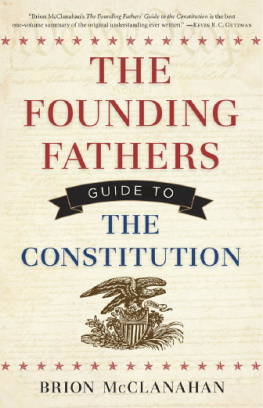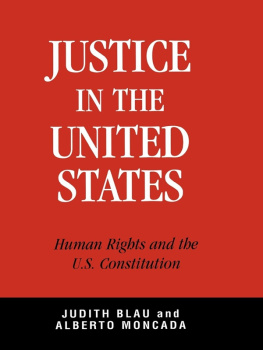ABOUT THE AUTHOR
Michael S. Greve is a professor at George Mason University School of Law. From 2000 to August 2012, he was the John G. Searle Scholar at the American Enterprise Institute, where he remains a visiting scholar. Before coming to AEI, Greve cofounded and, from 1989 to 2000, directed the Center for Individual Rights, a public interest law firm. Currently, he also chairs the board of the Competitive Enterprise Institute and is a frequent contributor to the Liberty Law Blog.
Greve has written extensively on many aspects of the American legal system. His publications include numerous law review articles and books, including most recently The Upside-Down Constitution (2012). He has also written The Demise of Environmentalism in American Law (1996); Real Federalism: Why It Matters, How It Could Happen (1999); and Harm-less Lawsuits? Whats Wrong With Consumer Class Actions (2005). He is the coeditor, with Richard A. Epstein, of Competition Laws in Conflict: Antitrust Jurisdiction in the Global Economy (2004) and Federal Preemption: States Powers, National Interests (2007); and, with Michael Zoeller, of Citizenship in America and Europe: Beyond the Nation-State? (2009).
ACKNOWLEDGMENTS
For helpful comments on an earlier draft of the book manuscript, I am indebted to John Dinan, Anna Gasaway, Anna Sophia Greve, and Michael Zuckert. Thanks also to Elizabeth DeMeo for her splendid assistance and to Greg Lane and AEIs Values & Capitalism team for capable editorial services and project management.
RECOMMENDED READING
Students who wish to explore the United States Constitution more extensively and deeply than I have attempted in this book will find the sheer amount of literature and information overwhelming. My own principal contribution [Michael S. Greve, The Upside-Down Constitution (Cambridge, MA: Harvard University Press, 2012)], is not a good way to pursue further study; it is written for a professional audience. It is much better to begin with the foundational texts and standard works. My list of recommendations includes many titles that you would find on any scholars list, along with some more idiosyncratic selections with bearing on the questions covered in this book.
BOOKS
The Founding
The must read is The Federalist , available in numerous serviceable editions. Far and away the best commentary is David F. Epstein, The Political Theory of the Federalist (Chicago: University of Chicago Press, 1984). The standard collection of the Antifederalists writings is Herbert Storing, ed., The Complete Anti-Federalist (Chicago: University of Chicago Press, 1981); among many useful compilations of the principal essays is W. B. Allen and Gordon Lloyd, eds., The Essential Antifederalist , 2nd ed. (Lanham, MD: Rowman & Littlefield, 2002). James Madisons and others notes on the Constitutional Conventionindispensable to understanding the Constitutions draftingare collected in Max Farrand, ed., The Records of the Federal Convention of 1787 (New Haven, CT: Yale University Press, 1911); also available online from the Liberty Fund at http://oll.libertyfund.org/?option=com_staticxt&staticfile=show.php%3Ftitle=1785&Itemid=27).
Among the hundreds of books on the founding, two brilliant works might prove particularly helpful in deepening your understanding: Ahkil Reed Amar, Americas Constitution: A Biography (New York: Random House Trade Paperbacks, 2006); and Jack N. Rakove, Original Meanings: Politics and Ideas in the Making of the Constitution (New York: Knopf, 1996).
Commentary; Constitutional Law
In the unions early decades, collections of judicial cases were haphazard; magisterial commentaries played an enormous role in shaping lawyers and judges understanding of the Constitution. The most important of these were the Commentaries on the Constitution of the United States (1833), by Joseph Story. The youngest justice ever to be appointed to the Supreme Court (at age 32, in 1811) and, next to John Marshall, the greatest jurist in our history, Story published (in 1840) an abridged version called A Familiar Exposition of the Constitution of the United States (Lake Bluff, IL: Regnery Gateway, 2000). It is a brilliant clause-by-clause exposition of the Constitution and its purposes.
The Founders Constitution , ed. Philip Kurland and Ralph Lerner (University of Chicago Press and the Liberty Fund, 2000), http://press-pubs.uchicago.edu/founders/, is an indispensable reference work. Clause by constitutional clause, it provides background information, excerpts from the debates at the Constitutional Convention, excerpts of early Supreme Court decisions, and additional authoritative materials.
Nowadays, constitutional law is taught from casebooks, which you will find in any law library. They are useful in finding competently edited Supreme Court decisions in major cases. However, because they are designed to drum cases into law students heads, they tend to confuse the Supreme Courts pronouncements with the actual Constitution. The exception is Michael Stokes Paulsen et al., The Constitution of the United States (New York: Foundation Press, 2010). Excerpts from major cases are accompanied by historical materials and extensive editors notes that put the cases in context.
Constitutional Theory
For a deep, substantive engagement with constitutionalism, I recommend two difficult, controversial, but immensely rewarding books: Bruce Ackerman, We the People: Foundations (Cambridge, MA: Harvard University Press, 1991); and Charles McIlwain, Constitutionalism: Ancient and Modern (Ithaca, NY: Cornell University Press, 1947).
Contemporary theorists have reformulated the Constitutions Lockean and Madisonian foundations in intriguing ways. These works, too, are difficult, but they may hold great reward for students with an interest in economics or political economy. The must read is James M. Buchanan and Gordon Tullock, The Calculus of Consent: Logical Foundations of Constitutional Democracy (Ann Arbor: University of Michigan Press, 1962), in many ways, the foundation of all modern constitutional theory. A very fine neo-Madisonian, game-theoretic account of how constitutions (and ours in particular) work is Robert D. Cooter, The Strategic Constitution (Princeton, NJ: Princeton University Press, 2000).
The Supreme Court
The fundamental point to comprehend is that the Supreme Court is both a court and a political agenta branch of government. The origin of that insight, and still the best source to explore it, is Robert G. McCloskey, The American Supreme Court (Chicago: University of Chicago Press, 2004). Like McCloskey, Barry Friedman, The Will of the People (New York: Farrar, Straus and Giroux, 2009), argues that the Supreme Court will over the long haul follow public sentiments. The authors theory is not free from doubt. However, the book provides a fascinating and reliable account of the Supreme Court in the context of public opinion over the course of our history. The footnotes are a very good place to begin a research or paper assignment on the major cases and controversies in Supreme Court history.
ONLINE RESOURCES
The Internet provides an enormous wealth of information on the U.S. Constitution and its history. The Law Library of Congress (www.loc.gov/law/help/guide/federal/usconst.php) offers a straightforward guide to key constitutional documents. The National Constitution Center (http://ratify.constitutioncenter.org/constitution/) is particularly helpful for students seeking to find information on specific sections of the Constitution. (It allows viewers to search by keyword or topic and to browse through Supreme Court cases.)
The Avalon Project at Yale Law School (http://avalon.law.yale.edu/subject_menus/constpap.asp), is an excellent source of primary materials, including documents from the Constitutional Convention and prior works that influenced and inspired the Constitution. The Heritage Foundations Guide to the Constitution (www.heritage.org/constitution) offers a detailed, clause-by-clause analysis of the Constitution, written by prominent scholars. Heritage is a staunchly conservative organization, and its site is explicitly devoted to an originalist understanding of the Constitution. However, it is commendably free from ideological bias.




